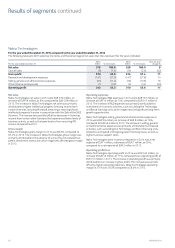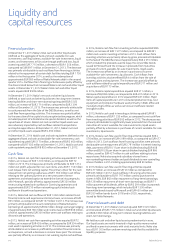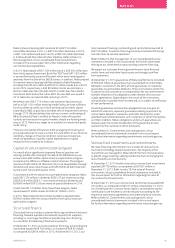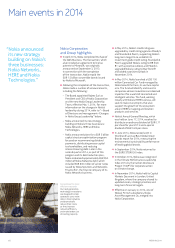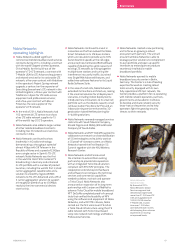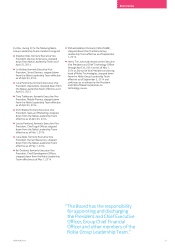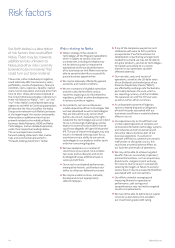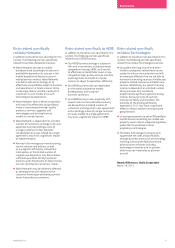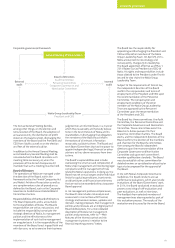Nokia 2014 Annual Report Download - page 74
Download and view the complete annual report
Please find page 74 of the 2014 Nokia annual report below. You can navigate through the pages in the report by either clicking on the pages listed below, or by using the keyword search tool below to find specific information within the annual report.NOKIA IN 201472
Sustainability and corporate
responsibility at Nokia
In this section we cover the
ethical, socio-economic and
environmental areas from
2014, which we dened as
most material to our business
and our stakeholders.
At Nokia, we want to be proud, not only of
what we achieve but also how we achieve it.
We are committed to valuing and respecting
both people and our planet in everything we
do and believe that by engaging others and
doing things together we can achieve a
signicantly larger impact.
The basic principles of our sustainability
workare:
■respecting people in everything we do;
■ protecting the environment;
■improving people’s lives with technology;
and
■making change happen together.
Within the guidance of these principles,
we maintain programs that help us promote
environmental and social sustainability.
By embedding the actual processes and
activities supporting sustainable development
in various functions, sustainability ultimately
becomes a vital part of everyone’s job
at Nokia.
Respecting people
in everything we do
Our goal is to create an organization where
ethical business practice and workforce
diversity are a source of pride and
employees have a safe and motivating
working environment.
The Nokia Code of Conduct sets out our
commitment to upholding high ethical
standards wherever we operate. We train
our employees on ethical business conduct
on an annual basis, and any concerns can and
should be reported, anonymously if required,
through established reporting channels.
The reported ethical concerns are
investigated thoroughly by our Ethics
and Compliance Oce.
We welcome men and women of dierent
cultural or ethnic backgrounds and in 2014 we
employed at least 130 dierent nationalities.
At December 31, 2014 the Nokia Group
Leadership Team included members from
the following countries: Singapore, Canada,
United Kingdom, United States and Finland,
and 13% of the senior management positions
within Nokia were held by women. Employees
of non-Finnish nationality held 72% of the
senior management positions.
The health, safety and well-being of our
employees and our contractors is pivotal to
how we conduct business. The Nokia Code
of Conduct also sets the standard for labor
conditions and we have a comprehensive
set of global human resources employment
policies in place to ensure fair employment.
Our health and safety management system is
certied in accordance with the international
management standard OHSAS 18001, which
ensures that Nokia has a risk-based approach
to managing the safety of employees
and contractors.
We believe communication networks also have
an important role in promoting human rights
by enabling freedom of expression, access to
information, exchange of ideas and driving
economic development. As a provider of
technologies and services that fuel our
information society, we recognize our
responsibility in helping to further the good
that such technologies and services are used
to respect, and not infringe, human rights.
This commitment is reinforced in our
Human Rights Policy, which underpins our
commitment to help prevent potential misuse
of our products and services in issues related
to freedom of expression and privacy. In
2014, we provided training to our employees
on human rights through ethical business
training programs and we arranged separate
training sessions for selected customer teams.
Protecting the environment
Our environmental work focuses on
minimizing the potential adverse impact of
our businesses and operations, and is based
on global principles and standards that we
integrate in our activities.
The most important areas of our
environmental work, based on the extent
of their impact on the environment and our
ability to manage them, originate from our
Nokia Networks business. Our priority is to
design products and services that help
telecommunications operators reduce the
environmental impact of their networks. In
addition, we aim to continuously minimize the
environmental impact of our own operations
in each of our businesses. Nokia Networks’
environmental management system (“EMS”)
helps us monitor progress and identify ways
to further improve in environmental matters
and is ISO 14001 certied. As an example
ofour progress in 2014, by increasing the
usage of the “box on pallets” product delivery
method (where boxes are loaded directly on
to pallets without any additional containers),
we were able to reduce the usage of
packagingmaterial. This change also
increased packaging density which in turn
decreased the CO2 emissions and costs
inthese particular deliveries.
50%
Of the electricity we used in 2014
came from renewable sources
At least 130
dierent nationalities worked
for Nokia in 2014


